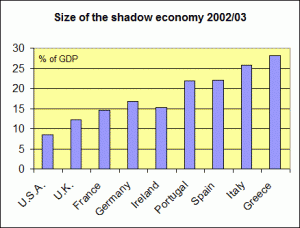From the way markets reacted, the trillion-dollar rescue package hurled by European leaders at the continent’s growing debt crisis might well have been code-named Panacea. Stocks rose all over the place while Greek bond yields tumbled on Monday. But this is far from the end of the story. The rescue package alleviated the growing Eurozone liquidity crisis, but the solvency crisis remains. While the acute problem (liquidity) was a serious threat, so is the chronic problem of excessive indebtedness that besets Greece, Portugal, Spain and Ireland.
The rescue plan cannot address the central problem, which is that countries with very different fiscal cultures (and earnings potential) are yoked to the same currency. The idea was that this would help the profligate keep in line, but instead it’s shaping up as a way for them to ship their liabilities to their fitter neighbors. How long will voters in rich countries stand for this? Perhaps not much longer than the voters in the debtor countries will stand for the austerity measures imposed on them.
The entire rescue plan presumably rests on the assumption that, with more time, the Eurozone’s problem countries can get their fiscal houses in order—and Europe can somehow grow its way out of trouble. But Greece and some of the other major European debtors are seriously uncompetitive. And the medicine of austerity may not work, if only because the patient may refuse to take it.
The countries in question are democracies, after all, and it is far from certain that Greece and the others will cut spending and raise revenue enough to make a difference. Austerity means stagnant wages; in Greece, public sector paychecks are supposed to shrink 10% along with pensions cuts and increases in the retirement age. But April inflation in Greece was the highest in the Eurozone — a rate of 4.8%. Higher taxes will continue to make life more expensive for people earning less money. It’s a volatile mix.
What is missing is a policy mechanism that provides a way to even out trade imbalances by recycling the surplus of counties such as Germany, Netherlands and France to the deficit countries for pro-growth direct investment. Germany did this with East Germany. If it can be accomplished, it’s one way Greece and the others can become competitive enough to secure their future through higher exports. This is in concert with the same adjustment mechanism that many Levy Institute Strategic Analysis reports (see for instance this one) have been suggesting for many years at the global level with regard to China in solving the problem of global imbalances.
It’s hard to see a positive European outcome from the rescue plan, given the perverse incentives in place. Higher taxes in Greece will only mean more tax evasion (see Gennaro Zezza’s insightful post on this). The bailout will only make it harder to convince people in Greece, Portugal and the other problem debtor nations that failing to change will result in disaster. Since the real rescue is of European banks that hold all this debt, we have once again a transfer of money from thrifty taxpayers to imprudent banks, making moral hazard more hazardous.
The markets may not like to hear it, but sooner or later Greece will have to restructure its debt; one or more of the others will probably have to do the same. Their structural primary deficits are simply too large to come into balance with all the deflationary austerity measures. Growth, in these countries, will be negative at least for the next two years after the current year. Meanwhile, the smart money is headed for the exits.




 ShareThis
ShareThis